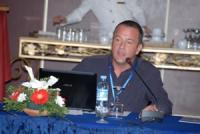
Nicolas Ritter founder of Prevention, Information and Fight against AIDS (PILS) speaking at the technical consultation on positive health, dignity and prevention. Casablanca, Morocco on 28 March 2010.
Nicolas Ritter is a pioneer in the drive to ensure that people living with HIV are at the centre of the AIDS response. He was the first person from Mauritius to announce publicly that he was HIV positive. “It seemed logical that people with HIV should be part of the response, but it took a long time for others with HIV to come forward, because of their fear of stigmatization,” said Ritter.
In 1996, Ritter founded Prevention, Information and Fight against AIDS (PILS) in Mauritius with the mission of campaigning for improving the quality of life for people living with HIV and involving them in all aspects of prevention. Fourteen years later, PILS now has 13 “positive ambassadors” who speak in schools, businesses and to the media about HIV prevention.
As antiretroviral treatment has given millions of people a new lease on life, HIV prevention programmes have begun to refocus their attention on people who know their HIV positive status to ensure people living with HIV are at the forefront of developing and implementing HIV policies. To support this, the Global Network of People living with HIV (GNP+) and UNAIDS held a technical consultation in Casablanca, Morocco on 28 March.
Positive Health, Dignity and Prevention
Around 30 international participants representing people living with HIV, civil society, government agencies, UNAIDS Cosponsors, international donors and development agencies took part in the discussions, which come almost a year after a key meeting in Tunisia. During that consultation, participants moved away from the expression “positive prevention,” finding that it stigmatized people living with HIV. To shift the unfair burden of responsibility for HIV transmission away from HIV positive people, they coined the term “Positive Health, Dignity and Prevention”.

Participants highlighted the importance of making positive health, dignity and prevention undeniable elements of combination prevention. Casablanca, Morocco on 28 March 2010.
During the consultation in Casablanca, stakeholders shared best practices, identified challenges, common goals and looked at opportunities in programming, politics and research. “This discussion has been vital in moving the debate forward,” said Nicolas Ritter, “we looked at ways to turn the concept of “Positive Health, Dignity and Prevention” into concrete action.”
Participants highlighted the importance of making positive health, dignity and prevention undeniable elements of combination prevention. They stressed a human rights approach based on legal protection and a policy environment free of discrimination and examined ways to address social vulnerabilities such as poverty, gender-based violence, xenophobia and homophobia. “We looked at the major roadblocks to dramatically increasing the participation of people living with HIV in prevention programmes,” said Helene Badini UNAIDS Regional Adviser, Social Mobilization.
5th Francophone Conference on HIV
The international consultation was held in Casablanca as part of the 5th Francophone Conference on HIV which is taking place from 28 to 31 March. The event brings together over 1,500 health professionals, researchers, government officials, civil society and leading francophone actors of the HIV response. The conference is chaired by Profession Francoise Barré-Sinoussi, Nobel Laureate for Medicine 2008. UNAIDS is collaborating in the event for the first time and in addition to the consultation on “Positive Health, Dignity and Prevention” it is also helping to organize a symposium on HIV and human rights on Tuesday with the United Nations Development Programme. UNAIDS Executive Director Mr Michel Sidibé will be speaking at Wednesday’s closing ceremony.





